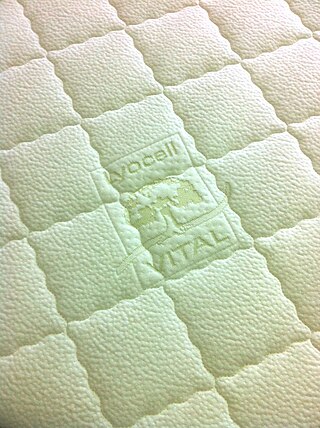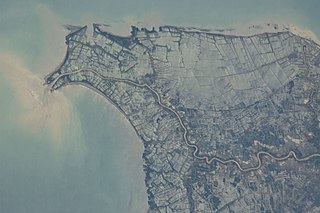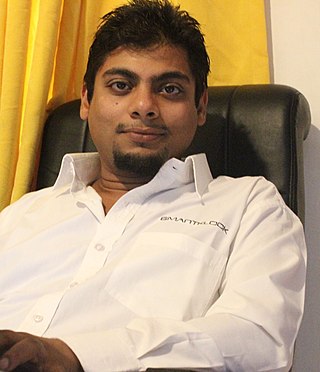Related Research Articles

Rayon, also called viscose and commercialised in some countries as sabra silk or cactus silk, is a semi-synthetic fiber, made from natural sources of regenerated cellulose, such as wood and related agricultural products. It has the same molecular structure as cellulose. Many types and grades of viscose fibers and films exist. Some imitate the feel and texture of natural fibers such as silk, wool, cotton, and linen. The types that resemble silk are often called artificial silk. It can be woven or knit to make textiles for clothing and other purposes.

Lyocell is a semi-synthetic fiber used to make textiles for clothing and other purposes. It is a form of regenerated cellulose made by dissolving pulp and dry jet-wet spinning. Unlike rayon; which is made by the more common viscose processes, Lyocell production does not use carbon disulfide, which is toxic to workers and the environment. Lyocell was originally trademarked as Tencel in 1982.
APR or Apr may refer to:

The Lenzing Group is an international group with its headquarters in Lenzing, Austria, and production sites in all major markets. Lenzing produces wood-based viscose fibers, modal fibers, lyocell fibers and filament yarn, which are used in the textile industry — in clothing, home textiles and technical textiles — as well as in the nonwovens industry. In addition, the company is active in mechanical and plant engineering. The Lenzing Group markets its products under the brand names TENCEL, VEOCEL, LENZING ECOVERO and LENZING.

Toray Industries, Inc. is a multinational corporation headquartered in Japan that specializes in industrial products centered on technologies in organic synthetic chemistry, polymer chemistry, and biochemistry.
Courtaulds was a United Kingdom-based manufacturer of fabric, clothing, artificial fibres, and chemicals. It was established in 1794 and became the world's leading man-made fibre production company before being broken up in 1990 into Courtaulds plc and Courtaulds Textiles Ltd.

Grasim Industries Limited is an Indian manufacturing company based in Mumbai. Since its inception in 1947 as a textile manufacturer, Grasim has diversified into textile raw materials like viscose staple fiber (VSF) and viscose filament yarn, chemicals and insulators, along with cement and financial services through its subsidiaries UltraTech Cement and Aditya Birla Capital respectively. The company is a part of the Aditya Birla Group.

The Citarum River is the longest and largest river in West Java, Indonesia. It is the third longest river in Java, after Bengawan Solo and Brantas. It plays an important role in the life of the people of West Java. It has been noted for being considered one of the most polluted rivers in the world.

Sustainable fashion') is a term describing efforts within the fashion industry to reduce its environmental impacts, protect workers producing garments, and uphold animal welfare. Sustainability in fashion encompasses a wide range of factors, including cutting CO2 emissions, addressing overproduction, reducing pollution and waste, supporting biodiversity, and ensuring that garment workers are paid a fair wage and have safe working conditions.

Aditya Vikram Birla was an Indian industrialist. Born into one of the largest business families of India, he oversaw the diversification of his group into textiles, petrochemicals and telecommunications. He was one of the first Indian industrialists to expand abroad, setting up plants in Southeast Asia, the Philippines and Egypt. His net worth was estimated at £250 million by 1995. His death at the age of 51 left his young son Kumar Mangalam Birla in charge of his group of companies.
Sukanto Tanoto, born Tan Kang Hoo is an Indonesian businessman primarily involved in resources-based manufacturing. After starting as a supplier of equipment and materials for the state-owned oil firm Pertamina, Tanoto moved into the forest industry in 1973. Tanoto's business interests are represented by the Royal Golden Eagle (RGE) group of companies, previously known as Raja Garuda Mas.

Bamboo textile is any cloth, yarn or clothing made from bamboo fibres. While historically used only for structural elements, such as bustles and the ribs of corsets, in recent years different technologies have been developed that allow bamboo fibre to be used for a wide range of textile and fashion applications.
Sateri is a business division of Royal Golden Eagle (RGE). It is a manufacturer of viscose rayon.
Royal Golden Eagle is a global integrated, resource-based industrial group, with businesses in paper, palm oil, viscose, construction and energy, property and asset management. Owned by Indonesian businessman Sukanto Tanoto, the group employs 60,000 people worldwide with assets exceeding US$30 billion.
The textile industry is the largest manufacturing industry in Pakistan and nearly 25 million people work in this industry. Pakistan is the eighth largest exporter of textile commodities in Asia. Textile sector contributes 8.5% to the GDP of Pakistan.

Clothing industry or garment industry summarizes the types of trade and industry along the production and value chain of clothing and garments, starting with the textile industry, embellishment using embroidery, via the fashion industry to apparel retailers up to trade with second-hand clothes and textile recycling. The producing sectors build upon a wealth of clothing technology some of which, like the loom, the cotton gin, and the sewing machine heralded industrialization not only of the previous textile manufacturing practices. Clothing industries are also known as allied industries, fashion industries, garment industries, or soft goods industries.

Vereinigte Glanzstoff-Fabriken was a German manufacturer of artificial fiber founded in 1899 that became one of the leading European producers of rayon.

Asian Agri is one of Asia's largest palm oil producers, with an annual production of 1 million tons of palm oil.

Jason Fernandes is Web3 entrepreneur, Investor, and technology columnist hailing from Goa. Fernandes is the co-founder of AdLunam Inc.a Web3 investment platform. As a teenager, Fernandes founded the internet portal ZeoCities.com, the non-profit LDKids.org and wrote for CHIP Magazine. Later, while studying at the University of Texas, Austin, Fernandes co-invented the Internet-based DVR, InstantTV, and was part of the founding team at PerceptiveI. Fernandes was a monthly technology columnist for GlobeAsia Magazine, Indonesia for 5 years producing over 60 columns over this period. Fernandes is often quoted in Web3 publications and has spoken at TEDx events.
Video gaming in Indonesia is a growing sector, holding the 16th largest market in the world and about half the Southeast Asian market in 2017. Over 40 million people in the country are active gamers, with mobile gaming being the dominant sector in terms of revenue. The development of video games in the country began with imported consoles and arcade centres, prior to developments of online gameplay in PC games and increasing prevalence of the internet cafés. Mobile games began gaining importance as smartphones were introduced.
References
- ↑ "APR Plots Indonesian Viscose-Rayon to Take Over World Fashion". Jakarta Globe. Retrieved 2019-04-04.
- ↑ "Indonesia's largest rayon facility to open August". www.just-style.com. 2018-01-29. Retrieved 2019-04-04.
- ↑ "Indonesia pushes Industry 4.0 reform onto receptive clothing industry". www.just-style.com. 2019-03-29. Archived from the original on 2019-04-06. Retrieved 2019-04-04.
- ↑ "We need to change the fast fashion model. Here's how". World Economic Forum. Retrieved 2019-04-04.
- ↑ "APR Plots Indonesian Viscose-Rayon to Take Over World Fashion". Jakarta Globe. Retrieved 2019-04-04.
- ↑ "Large Indonesian viscose facility to open in August". www.textilemedia.com. Retrieved 2019-04-04.
- ↑ Industry.co.id (2018-01-22). "Rayon Factory Supports National Textile Industry in Global Competition". Industry.co.id. Retrieved 2019-04-04.
- ↑ "APR Expects Completion of Indonesia's Largest Integrated Rayon Factory by August". Jakarta Globe. Retrieved 2019-04-04.
- ↑ "Viscose-Rayon: Next Big Thing in Sustainable Fashion". Jakarta Globe. Retrieved 2019-04-04.
- ↑ "Widodo Launches Roadmap for Industry 4.0: "Making Indonesia 4.0" | Indonesia Investments". www.indonesia-investments.com. Retrieved 2019-04-10.
- ↑ "Asia Pacific Rayon Drives Value-Chain Integration, Sustainable Fashion". Inside RGE. 2019-04-05. Retrieved 2019-04-10.
- ↑ "APR Expects Completion of Indonesia's Largest Integrated Rayon Factory by August". Jakarta Globe. Retrieved 2019-04-04.
- ↑ "About Us | APR Rayon Viscose Rayon Producer Indonesia". Asia Pacific Rayon. Retrieved 2019-04-04.
- ↑ "APR Plots Indonesian Viscose-Rayon to Take Over World Fashion". Jakarta Globe. Retrieved 2019-04-04.
- ↑ Castillo, Michael del. "World's Largest Business Organization Embraces Blockchain". Forbes. Archived from the original on April 11, 2019. Retrieved 2019-04-16.